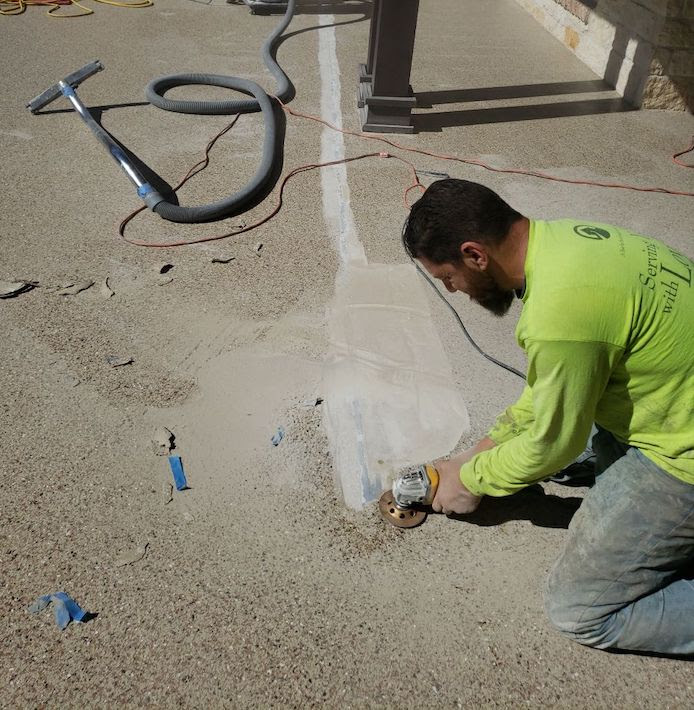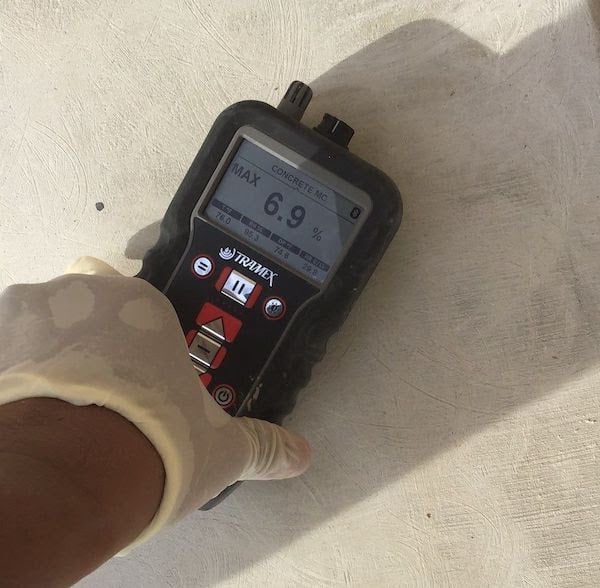Can you coat over cracked concrete? How to prepare concrete for a coating
October 11th, 2021 | 9 min. read
Get weekly updates with the most recent articles and videos from Southwest Exteriors.
Subscribe

When you look at your garage, driveway, sidewalk, or patio, what do you see?
Maybe your concrete surface is spotless because you’ve just moved into a brand new build. Or perhaps you see stains and cracks from the years of daily wear and tear.
Whether you’re looking to spruce up your garage floor or add a slip-resistant surface around your pool deck, chances are your concrete isn’t perfect.
Like any remodeling project, the prep work is one of the most crucial steps to the success of your project. A concrete coating is no exception.
If your concrete surface isn’t cared for before laying a coating down, the result will not be what it should be. The coating will turn out uneven, can bubble, and start to peel up before its lifetime is over.
Southwest Exteriors has been an exterior remodeling contractor in San Antonio since 1989. We have specialized in installing concrete coatings for the past several years. We know the difference between a high-quality concrete coating and one that has failed due to poor installation because we’ve seen it too many times.
Care and attention to detail throughout every step of the process are among the most important values to us because we know how much of a difference it makes if the final product.
This article will outline what must be inspected, what must be done to properly prep a concrete surface before a coating, and what will happen if a surface is not prepared properly.
After reading, you will understand the exact steps necessary to prep concrete for a coating and know the importance of each step. You will also be able to identify if you have any areas on your concrete surface that will need special attention so you can avoid any surprises after meeting with a contractor.
What needs to be inspected before a concrete coating?
Assessing the concrete surface that you want to be coated is an essential part of your consultation with a contractor before any construction begins.
If a contractor does not take the time to inspect the moisture content, hardness level, and cracks in your concrete, then there’s a good chance they won’t handle them properly when it comes time to coat.
Here we will outline how to inspect each of these in a concrete surface and what needs to be done to properly prep the surface before a coating.
How is moisture content measured in concrete?
When it rains, you water the grass, or accidentally spill your cup of coffee down the driveway, you’ve noticed that concrete absorbs moisture.
But concrete can indeed be too moist for a coating to be applied over it. If concrete is too moist, the coating will not apply and cure properly. So, how do you measure the moisture content of the concrete?
The moisture content is tested by using a moisture meter that measures the percentage of moisture in the concrete. Water in concrete is normal and perfectly fine, but too much water will not allow the coating product to apply correctly.

Example of a moisture meter reading 6.9% moisture content in the concrete.
If my concrete is too moist, how can it be fixed?
If the concrete has too high of moisture content, a moisture barrier will need to be applied before the coating can begin.
This moisture barrier is a liquid applied on the concrete surface, acts as a cap on the concrete, and allows the coating to adhere and cure properly.
High-quality moisture barriers have a cure time of fewer than 30 minutes, so they will not disrupt the timeliness of your project. However, it is important to know what type of product your contractor uses to know if it will create a long setback on your project time.
What happens if a coating is put on top of moist concrete?
If concrete is too moist and is not treated beforehand, the coating will not absorb and adhere to the concrete properly.
Moisture in concrete can cause bubbling in the coating once it’s dry. If the coating does not grip the concrete, it will peel up over time and will not last.
How is hardness measured in concrete?
Did you know that concrete can be soft? It sounds like a twisted juxtaposition, but it’s true.
The Mohs hardness test is used to determine the hardness level of the concrete. This needs to be measured to determine what kind of diamond will be used to grind the concrete.
In this test, a consultant will take a pencil-like tool with two different-sized probes on either end. Then, they will gently scrape at the concrete, starting with the largest size nine. If the probe leaves a scratch on the concrete, then the concrete is softer than a nine. They will then continue to scratch the concrete, continuously moving down in size of the probe until it does not leave a scratch. The smallest probe size is two.
Once they have reached the size that does not scratch, that correlates with the hardness level of the concrete. This then tells installers what type of diamond is needed to grind the concrete effectively.
If the wrong type of diamond is used to grind the concrete, the concrete will not be ground correctly, and it can lead to damaging either the concrete or the diamond grinder.
If my concrete is too soft, how can it be fixed?
If the concrete is too soft, a densifier will need to be added to it before the coating process can begin.
This densifying liquid will absorb into the concrete and strengthen it from within, allowing the coating to adhere to the surface properly.
If a densifier or moisture barrier must be applied to your concrete surface, this will add on to the total cost slightly.
What happens if a coating is applied to concrete that is too soft?
The biggest risk that occurs when a coating is put on top of concrete that is too soft is that it can further damage the integrity of the concrete.
When absorbed, the coating can cause the concrete to crumble and crack underneath.
Like if the concrete is too moist, a coating will not adhere properly to soft concrete, and it will not last as long as it should.
If your concrete is damaged from the coating, this will cost you to have your concrete ripped up and relaid completely.
How are cracks, chips, and pitting measured in concrete?
The last things that must be inspected before coating concrete are cracks, chips, and pitting.
Pitting refers to any small holes that form on the concrete surface. Some concrete types are made with intentional pitting, such as concrete with a rock-salt finish.
Cracks are measured by the linear foot to determine the amount of added labor and cost to the total cost. If a crack is thicker than the thickness of a credit card, it must be mended properly before the coating is applied.
A concrete professional may need to repair any major pitting or chipping before any coating is applied on top.
If I have cracks, chips, or pitting, how can it be fixed?
Cracks, small chips, and larger pitted spots must be repaired using a concrete mender applied in the crack and expands and levels to mend the crack.
If you have a concrete finish purposefully pitted, it will require extra grinding with a diamond grinder to smooth out the surface.
What happens if a coating is applied over cracks, chips, or pitting?
If a coating is applied over a concrete surface with cracks, chips, or pitting, the result is will not be an even coating.
Because these cracks and pitting create an uneven surface, it does not allow the coating to spread evenly and adhere to the entire surface. This will create peeling and chipping in the coating after minimal use, causing you to replace the coating sooner than expected.
If my concrete is in good condition, does anything need to be done before applying a coating?
Even if your concrete appears to be in perfect shape, necessary preparation is still required to get a high-quality coating application.
The concrete surface must be grinded down using an industrial diamond grinder to create an even, smooth surface most ideal for a concrete coating.
While your brand new home’s garage may look perfectly smooth, there are still small amounts of grit, dust, and most likely a concrete lamination over it to make it shiny.
What happens if the concrete is not ground before a coating?
If a concrete surface is not properly ground before applying a coating, the result of the coating will not be as even as it should, and you also risk the coating not adhering to the concrete properly.
Grinding the concrete ensures an even, leveled surface for the coating to be applied. The concrete must be in this ideal condition to guarantee the coating's quality, durability, and longevity.
Choosing a high-quality contractor that knows how to handle your concrete floor
Now you know what must be done to properly prepare your concrete flooring before a coating. This is just one small piece of information you need to know to have an educated conversation with a contractor you’re considering.
A foundational understanding of the concrete coating installation process is just one necessary part to educate yourself on to make sure you find a high-quality contractor. In fact, asking about the installation process is just one of ten questions that we recommend you ask each contractor every time.
You want to ensure the contractor you choose knows how to properly prepare your garage floor, pool deck, or driveway and won’t just slap a coating down as fast as possible.
This article will outline 10 questions you need to ask a concrete coating contractor during a consultation. This way you can identify a high-quality contractor that will give you concrete coating of your dreams and avoid being blindsided by a shiny salesperson with a low-quality solution.
Are you looking for the right contractor you can trust?
Handling the moisture content, hardness, cracks, and smoothing the surface of concrete properly ensures the quality and longevity of your new coating.
Here at Southwest Exteriors, we’re a San Antonio based concrete coating specialist. We want to inform you of the entire process of a concrete coating, from the preparation to the final topcoat. We pride ourselves on our attention to detail and know the difference in the quality of the outcome it makes.
As long as you have the right type of concrete that we can coat, we’ll provide as much special attention to the imperfections as we need to give you the best concrete coating you deserve.
Are you ready to start your concrete coating project? Schedule a free in-home consultation with a design consultant by filling out the form on our webpage. A representative will call you within five minutes to talk with you about your project and help schedule your consultation.
